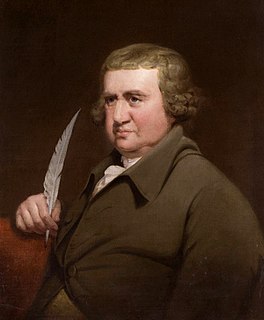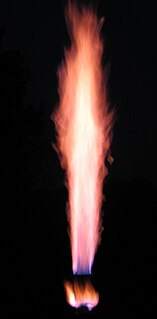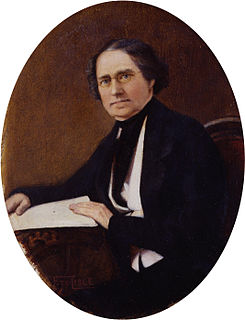
Erasmus Darwin was an English physician. One of the key thinkers of the Midlands Enlightenment, he was also a natural philosopher, physiologist, slave-trade abolitionist, inventor, and poet.

An environmentalist is a person who is concerned with and/or advocates for the protection of the environment. An environmentalist can be considered a supporter of the goals of the environmental movement, "a political and ethical movement that seeks to improve and protect the quality of the natural environment through changes to environmentally harmful human activities". An environmentalist is engaged in or believes in the philosophy of environmentalism.

Science is a systematic enterprise that builds and organizes knowledge in the form of testable explanations and predictions about the universe.

Natural science is a branch of science concerned with the description, prediction, and understanding of natural phenomena, based on empirical evidence from observation and experimentation. Mechanisms such as peer review and repeatability of findings are used to try to ensure the validity of scientific advances.
Transcendentalism is a philosophical movement that developed in the late 1820s and 1830s in the eastern United States. A core belief is in the inherent goodness of people and nature, and while society and its institutions have corrupted the purity of the individual, people are at their best when truly "self-reliant" and independent. Transcendentalists saw divine experience inherent in the everyday, rather than believing in a distant heaven. Transcendentalists saw physical and spiritual phenomena as part of dynamic processes rather than discrete entities.

Wood gas is a syngas fuel which can be used as a fuel for furnaces, stoves and vehicles in place of gasoline, diesel or other fuels. During the production process biomass or other carbon-containing materials are gasified within the oxygen-limited environment of a wood gas generator to produce hydrogen and carbon monoxide. These gases can then be burnt as a fuel within an oxygen rich environment to produce carbon dioxide, water and heat. In some gasifiers this process is preceded by pyrolysis, where the biomass or coal is first converted to char, releasing methane and tar rich in polycyclic aromatic hydrocarbons.

William Whewell was an English polymath, scientist, Anglican priest, philosopher, theologian, and historian of science. He was Master of Trinity College, Cambridge. In his time as a student there, he achieved distinction in both poetry and mathematics.

Professor Dionysius Lardner FRS FRSE was an Irish scientific writer who popularised science and technology, and edited the 133-volume Cabinet Cyclopædia.

Stanley "Stan" WilliamMarsh is a main character of the animated television series South Park. He is voiced by and loosely based on series co-creator Trey Parker. Stan is one of the series' four central characters, along with Kyle Broflovski, Eric Cartman, and Kenny McCormick. He debuted on television when South Park first aired on August 13, 1997, after having first appeared in The Spirit of Christmas shorts created by Parker and long-time collaborator Matt Stone in 1992 and 1995.

William Morton Wheeler was an American entomologist, myrmecologist and Harvard professor.

Natural philosophy or philosophy of nature was the philosophical study of nature and the physical universe that was dominant before the development of modern science. It is considered to be the precursor of natural science.

Formula Three, also called Formula 3, abbreviated as F3, is a third-tier class of open-wheel formula racing. The various championships held in Europe, Australia, South America and Asia form an important step for many prospective Formula One drivers. Formula Three has traditionally been regarded as the first major stepping stone for F1 hopefuls – it is typically the first point in a driver's career at which most drivers in the series are aiming at professional careers in racing rather than being amateurs and enthusiasts. F3 is not cheap, but is regarded as a key investment in a young driver's future career. Success in F3 can lead directly to a Formula 2 seat or even a Formula One test or race seat.

The Vultee Aircraft Corporation became an independent company in 1939 in Los Angeles County, California. It had limited success before merging with the Consolidated Aircraft Corporation in 1943, to form the Consolidated Vultee Aircraft Corporation − or Convair.
Powerset was an American company based in San Francisco, California, that, in 2006, was developing a natural language search engine for the Internet. On July 1, 2008, Powerset was acquired by Microsoft for an estimated $100 million.
Notability is the property of being worthy of notice, having fame, or being considered to be of a high degree of interest, significance, or distinction. It also refers to the capacity to be such. Persons who are notable due to public responsibility, accomplishments, or, even, mere participation in the celebrity industry are said to have a public profile.

The South African Railways Class 15C 4-8-2 of 1925 was a steam locomotive.
Charles Frederick Partington was a British science lecturer and writer.
SMPTE ST 2071 is a suite of standards published by the Society of Motion Picture and Television Engineers (SMPTE) that define a framework, protocol, and method of service discovery for the control of objects within an Internet of Things. The standards focus on the interoperability and discoverability of objects within the network, and treat media as first-class citizen. The standard also describes a programming methodology that allows objects to describe their behaviors (features) to other objects over the network and allows objects to change their behavior dynamically at runtime. Application developers developing to the SMPTE ST 2071 standards focus on writing their applications to the behaviors they wish to support and not the object or class of object that implements those behaviors.

The MeMZ 965 was a Soviet automobile engine, built by the Melitopolski Motor Plant (MeMZ).
Sanjay Ghemawat is an Indian American computer scientist and software engineer. He is currently a Senior Fellow at Google in the Systems Infrastructure Group. Ghemawat's work at Google, much of it in close collaboration with Jeff Dean, has included big data processing model MapReduce, the Google File System, and databases Bigtable and Spanner. Wired have described him as one of the "most important software engineers of the internet age".













